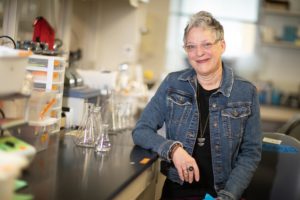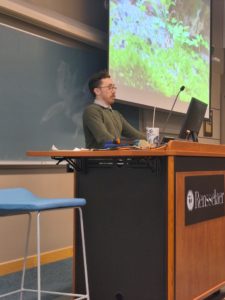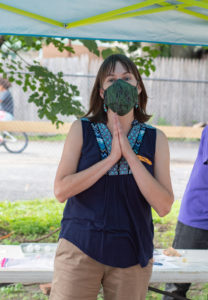Abby Kinchy
Abby Kinchy is a sociologist whose research and teaching focus on environmental challenges and the relationship between science and democracy. She lives in Troy, NY, where she is a professor in the Department of Science and Technology Studies at Rensselaer Polytechnic Institute. Kinchy has written two books that explore how ordinary people use “citizen science” to examine environmental problems and advocate for solutions. Science by the People: Participation, Power, and the Politics of Environmental Knowledge, co-authored with Aya Kimura, compares case studies in the United States, Japan, Mexico, and other parts of the world, where citizen scientists have investigated the impacts of shale oil and gas, nuclear power, and genetically engineered crops. Seeds, Science, and Struggle: The Global Politics of Transgenic Crops focuses on farmers and activists in Mexico and Canada who organized in defense of traditional seed-saving practices and alternatives to industrialized agriculture. Kinchy also led the Watershed Knowledge Mapping Project, a study of volunteer watershed monitoring projects in Pennsylvania and New York, where concerned citizens aimed to use water quality data to protect their streams from the impact of natural gas development.
Email: kincha@rpi.edu
Sebastián Ureta
Sebastián Ureta is an Associate Professor at Pontificia Universidad Católica de Chile, with joint appointments at College UC and Instituto para el Desarrollo Sustentable. His central area of interest is the analysis of policies, practices, and conflicts associated with the governance of environmental degradation and restoration in Chile. He is currently developing research projects on the regulation of soil contamination and productive transitions in marine environments. On his projects he mixes ethnographic methods with action-research initiatives, especially citizen science. Besides papers in leading journals, he has published the books “Assembling Policy: Transantiago, Human Devices, and the Dream of a world-class Society” (MIT Press, 2015), “Worlds of Gray and Green: Mineral extraction as ecological practice” (University of California Press, 2022) and “Experimentos Políticos: Repensando la implementación de políticas públicas” (Ediciones Universidad Alberto Hurtado, 2023).
Mónica Ramírez-Andreotta
Dr. Mónica Ramírez-Andreotta is an associate professor of Environmental Science (ENVS) with joint appointments in Public Health and Global Change at University of Arizona (UArizona). She is the Director of the UArizona NIEHS Superfund Research Program’s Research Translation Core and oversees three co-created community science (CS) programs, Gardenroots, Project Harvest, and Rethinking Wildfires, Floods and Health, partnering with EJ communities to answer their research questions and following a community-first reporting model. As demonstrated by her flagship CS programs, she applies the peer/empowerment education model, strives to elucidate and eradicate environmental health risks, and co-designs public health prevention/intervention programs and communication strategies to engage, build efficacy, and address structural challenges in underrepresented, underserved, and affected populations. These efforts have been nationally recognized, e.g., NIEHS Extramural Paper of the Month, NIEHS 2021 Papers of the Year, Environmental Health Perspectives, Editors’ Choice Collection 2021. Her efforts have been honored at the UArizona with the 2023 UA Distinguished Scholar Award and the 2018 Science and Engineering Excellence Award for Campus-Community Outreach for STEM Diversity. She has also been nationally recognized and received the 2019 American Association for the Advancement of Science Early Career Award for Public Engagement with Science, gave the 2022 NIEHS Keystone Seminar, received the 14th Annual NIEHS Karen Wetterhahn Award, selected for the 2020 Exploratorium’s Osher Fellowship and 2016 U.S. – Mexico Border Health Commission’s Leaders Across Borders Program, and completed a Science and Art Communication Fellowship. Notably, Dr. Ramírez-Andreotta was invited to present at the 2022 South by Southwest Conference in Austin, TX which celebrates the convergence of technology, film, music, education, and culture. This event epitomizes her as a scientist and her approach to research translation. Since 2020, she is an Associate Editor/Editorial Review Board Member for Environmental Justice and Journal of Exposure Science and Environmental Epidemiology. Dr. Mónica Ramírez-Andreotta serves on the Association for the Advancing Participatory Sciences Board of Directors (2021-2024) and USEPA Office of Research and Development’s Board of Scientific Counselors (2022-25).
Salvatore Engel-Di Mauro
Salvatore Engel-Di Mauro is Professor at the Geography and Environmental Studies Department of SUNY New Paltz. Research and publication topics include environmental justice, soil and vegetable contamination (focusing on trace metals), soil acidification, and urban agriculture. Among his most recent books are Urban Food Production (with G. Martin) and the co-edited volume The Routledge Handbook of Latin America and the Environment. He is Senior Editor for Capitalism Nature Socialism and Reviews Editor for Human Geography. He teaches courses on physical geography, gender and environment, people-environment relations, and soils.
Kathy High

Kathy High, a professor of Arts at Rensselaer and an interdisciplinary artist working with technology, art and science, will work with the research team to create media and tangible artifacts to facilitate new kinds of interactions with and reflections about soil. High regularly collaborates with scientists, and her work considers living systems and the social, political and ethical dilemmas of biotechnology and surrounding industries. High is the Coordinator of NATURE Lab (North Troy Art, Technology and Urban Research in Ecology), a volunteer-run project founded in 2013, which aims to connect artists, scientists, and neighborhood residents around urban ecological issues and environmental justice.
Dan Walls

Dan Walls is a chemical engineer who investigates the scientific, sociopolitical, and economic aspects of pollution and environmental degradation. He has research experience in fluid mechanics, transport phenomena, rheology, environmental remediation, and community-engaged environmental justice projects. As a postdoctoral researcher with Abby Kinchy from 2020 to 2022, Dan joined the Our Soil project to investigate heavy metal contamination of urban soils. He contributed to developing and facilitating collaborative soil workshops with city residents in Troy, NY, USA, and Arica, Chile, to analyze their soils and devise a plan of action to improve community health. He led the work on the low-cost, accessible screening tools used to measure lead and arsenic in soil. He also conducted in-depth interviews with university researchers, agency officials, and environmental advocates focused on assessing and addressing soil contamination. Dan is currently an environmental engineer with the Philadelphia Water Department where he works with schools, childcare facilities, and residents across the city to analyze drinking water for lead and other contaminants. His goal is to identify sources of lead, prevent exposure, and safeguard public health.
Bucky Stanton
 Bucky Stanton is a Postdoctoral Research Associate in the Department of Science and Technology Studies at Rensselaer Polytechnic Institute, where he received his doctorate in 2023. He also teaches Introduction to Science, Technology, and Society as an Adjunct Faculty Member. Under the supervision of Abby Kinchy, his postdoctoral research is part of a multidisciplinary NSF-funded project, that aims to bring environmental STS scholars together with electrical and microbial engineers to create an accessible microbial biosensor. Specifically, he is conducting an ethnography in Dr. Shayla Sawyer’s biosensing laboratory and of arsenic contaminated communities across New York state. His research interests related to this project range from the compositional politics of participatory research and soil knowledges and the history and politics of biosensing to the dynamics of human-microbial relationships in and beyond the laboratory.
Bucky Stanton is a Postdoctoral Research Associate in the Department of Science and Technology Studies at Rensselaer Polytechnic Institute, where he received his doctorate in 2023. He also teaches Introduction to Science, Technology, and Society as an Adjunct Faculty Member. Under the supervision of Abby Kinchy, his postdoctoral research is part of a multidisciplinary NSF-funded project, that aims to bring environmental STS scholars together with electrical and microbial engineers to create an accessible microbial biosensor. Specifically, he is conducting an ethnography in Dr. Shayla Sawyer’s biosensing laboratory and of arsenic contaminated communities across New York state. His research interests related to this project range from the compositional politics of participatory research and soil knowledges and the history and politics of biosensing to the dynamics of human-microbial relationships in and beyond the laboratory.
Bucky’s other research interests include underground environments, energy extraction, green transitions, archaeological and geological knowledge production, historicity, and temporality. In his dissertation, “Arcadian Pasts and Futures” he explored the history and politics of lignite coal exploitation around the town of Megalopolis in the central Peloponnesian highlands of southern Greece. Combining historical and ethnographic methods, he traces the historical and temporal unmooring resulting from its contested transition away from hydrocarbons to an uncertain future.
In his spare time, he enjoys tending to the aquatic denizens (fishes, shrimps, snails, and other microfauna) of his numerous planted aquascapes. He also happily serves his three beloved cats. Recently, he has taken up gardening and amateur woodworking.
stantn3@rpi.edu



